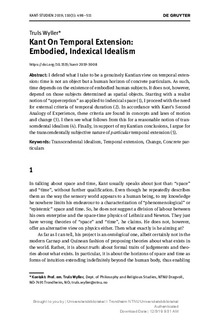Kant on Temporal Extension: Embodied, Indexical Idealism
Journal article, Peer reviewed
Published version

Åpne
Permanent lenke
http://hdl.handle.net/11250/2631867Utgivelsesdato
2019Metadata
Vis full innførselSamlinger
Sammendrag
I defend what I take to be a genuinely Kantian view on temporal extension: time is not an object but a human horizon of concrete particulars. As such, time depends on the existence of embodied human subjects. It does not, however, depend on those subjects determined as spatial objects. Starting with a realist notion of “apperception” as applied to indexical space (1), I proceed with the need for external criteria of temporal duration (2). In accordance with Kant’s Second Analogy of Experience, these criteria are found in concepts and laws of motion and change (3). I then see what follows from this for a reasonable notion of transcendental idealism (4). Finally, in support of my Kantian conclusions, I argue for the transcendentally subjective nature of particular temporal extension (5).